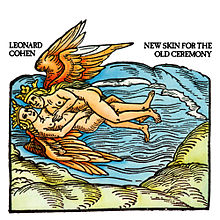New Skin for the Old Ceremony
| New Skin for the Old Ceremony | ||||
|---|---|---|---|---|
 |
||||
| Studio album by Leonard Cohen | ||||
| Released | August 11, 1974 | |||
| Recorded | February 1974 | |||
| Studio | Sound Ideas Studio, New York | |||
| Genre | Folk rock | |||
| Length | 37:11 | |||
| Label | Columbia | |||
| Producer |
|
|||
| Leonard Cohen chronology | ||||
|
||||
| Professional ratings | |
|---|---|
| Review scores | |
| Source | Rating |
| AllMusic | |
| Robert Christgau | A− |
| Rolling Stone | mixed |
New Skin for the Old Ceremony is the fourth studio album by Leonard Cohen. On this album, he begins to evolve away from the rawer sound of his earlier albums, with violas, mandolins, banjos, guitars, percussion and other instruments giving the album a more orchestrated (but nevertheless spare) sound. The album has been certified silver in the UK, but never entered the Billboard Top 200.
For his fourth album, Cohen chose to work with John Lissauer, a recent college graduate and rising producer whose jazz background contrasted sharply with Bob Johnston, the Nashville-based producer who had been at the helm of Cohen's two previous releases, 1969's Songs From a Room and 1971's Songs of Love and Hate. According to the Anthony Reynolds 2010 book Leonard Cohen: A Remarkable Life, Cohen sat on Lissauer's couch and played him his new songs on his guitar at the producer's loft on 18th Street in New York City, and eventually cut a handful of demos at a CBS studio before moving to Sound Ideas studio in February. Reynolds reports that Lissauer had the impression that the whole Nashville experience, including the 1972 European tour with "The Army" (the touring band that Johnson assembled) had been a bit overwhelming for Cohen: "It was like a big wave picking him up, and while he had fun it didn't quite have the artistic sensibility that Leonard needed. The focus then had been on this Nashville energy thing."
Lissauer assembled a new group of new musicians to join Cohen in the studio, including double bass player John Miller, as well as engineers Rip Lowell and Leanne Ungar. Lissauer brought a European tinge to many of the songs, adding a depth and richness by employing woodwinds, viola, and strings. The album is notable for its very dry mix, with reverb and echo used very sparingly. The album features several popular Cohen compositions, most notably "Chelsea Hotel #2" ("Chelsea Hotel," the precursor to "Chelsea Hotel #2," was only performed live and co-written by Cohen and his guitarist Ron Cornelius). "Chelsea Hotel #2" refers to a sexual encounter in the Chelsea Hotel, probably New York City's most famous Bohemian hostelry. For some years, when performing this song live, Cohen would tell a story that made it clear that the person about whom he was singing was Janis Joplin. Cohen would eventually come to regret his choice to make people aware that the song was about Joplin, and the graphic detail in which the song describes their brief relationship. In a 1994 broadcast on the BBC, Cohen said it was "an indiscretion for which I'm very sorry, and if there is some way of apologising to the ghost, I want to apologise now, for having committed that indiscretion."
...
Wikipedia
